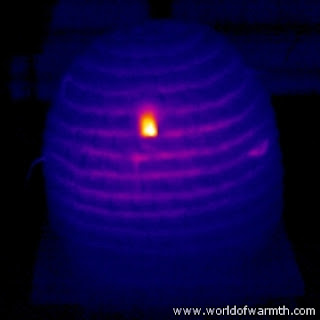Wednesday, March 28, 2012
Planting Edible Landscaping at Millennium Park!
Attractive (with a bit more water) and edible urban agriculture! I wonder what they'll do with the harvest?
Thursday, March 22, 2012
My Failures in Composting
I've been keeping a compost pile going on six years now and I don't think I've ever had a good batch that I can use in my garden. I'm so frustrated I'm about to give up. I just had the last straw when I went to go turn over my (spinning drum style) composter and saw that I have an entire ecosystem of fruit flies flying around it. Gladly, it's in an out of the way part of my yard, but it's a nuisance and a reminder that composting is an art, not a science.
Composting experts will tell you to have a 50/50 ration of "dry or brown" to "wet or green" ingredients. I tend to put more green ingredients, my kitchen and garden scraps, and forget to put in more brown ingredients, such as shredded bills, newspaper or leaves. The result is an anaerobic mess that never quite cures and attracts pests.
But as much as I want to, I'm not giving up. In fact, I'm doubling down and getting a cute little crock that will sit on my counter when I have kitchen scraps (instead of a plastic bag out the back) and I'm going to go dump a bunch of leaves in the composter. Then I'll cross my fingers and hope that history does not repeat itself and I have usable compost by the time planting season begins.
An idea for entrepreneurs out there - start a composting service. Green minded folks with no ability to compost (me) will sign up. You can pick up our kitchen scraps once or twice a week, compost it, and then sell us back our waste in the form of local, organic garden soil. I know the awesome community Prairie Crossing has a similar service in Gray's Lake, Illinois. Someone needs to start one in my town. But for all the reasons mentioned above, it won't be me.
Composting experts will tell you to have a 50/50 ration of "dry or brown" to "wet or green" ingredients. I tend to put more green ingredients, my kitchen and garden scraps, and forget to put in more brown ingredients, such as shredded bills, newspaper or leaves. The result is an anaerobic mess that never quite cures and attracts pests.
But as much as I want to, I'm not giving up. In fact, I'm doubling down and getting a cute little crock that will sit on my counter when I have kitchen scraps (instead of a plastic bag out the back) and I'm going to go dump a bunch of leaves in the composter. Then I'll cross my fingers and hope that history does not repeat itself and I have usable compost by the time planting season begins.
An idea for entrepreneurs out there - start a composting service. Green minded folks with no ability to compost (me) will sign up. You can pick up our kitchen scraps once or twice a week, compost it, and then sell us back our waste in the form of local, organic garden soil. I know the awesome community Prairie Crossing has a similar service in Gray's Lake, Illinois. Someone needs to start one in my town. But for all the reasons mentioned above, it won't be me.
Backyard Living Space
 |
| Backyard Proposal by Amy Coffman Phillips for Liquid Triangle Sustainability |
Labels:
Design,
garden design,
portfolio,
Residential Architecture
Tuesday, March 20, 2012
The Bees are out...and it's March
 |
| Photo credit: AskNature.org |
Labels:
animal organism,
bees,
biomimicry,
ecosystem,
iSite
Learning Resilience from a Sea Star
 |
| Image credit: AskNature.org |
Labels:
iSite
What I've been doing for the last month...
 |
| My Future Basement |
Labels:
About Me,
portfolio,
Residential Architecture
Tuesday, March 6, 2012
How do you recreate Africa in Orlando?

I recently returned from my first trip to Disney World in Orlando, Florida for the first time in over twenty years and I'm exhausted, but my kids had a great time. At 2 and 4, they were rather overwhelmed, but my 2 year old son really took to Animal Kingdom, which was the one I was most looking forward to as well. And it got me thinking - how did the designers really make it possible that the flora and fauna that is adapted to an African climate can survive in a former swamp like Orlando? I would have thought that the two climates would be too different, but as I sat outside of my room at the Animal Kingdom at night with a constructed savanna outside my balcony, they somehow did it.
Subscribe to:
Comments (Atom)

